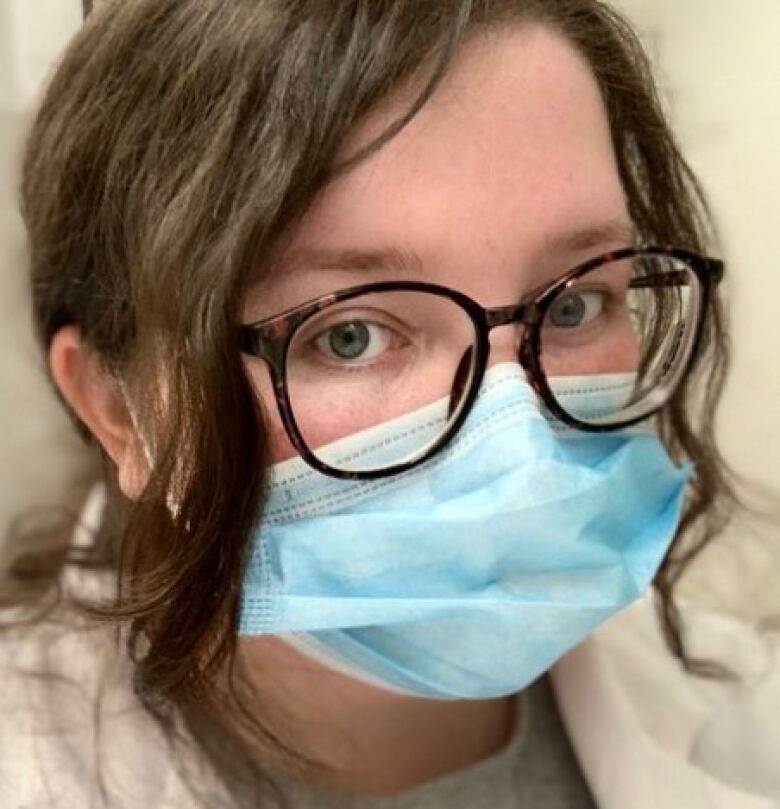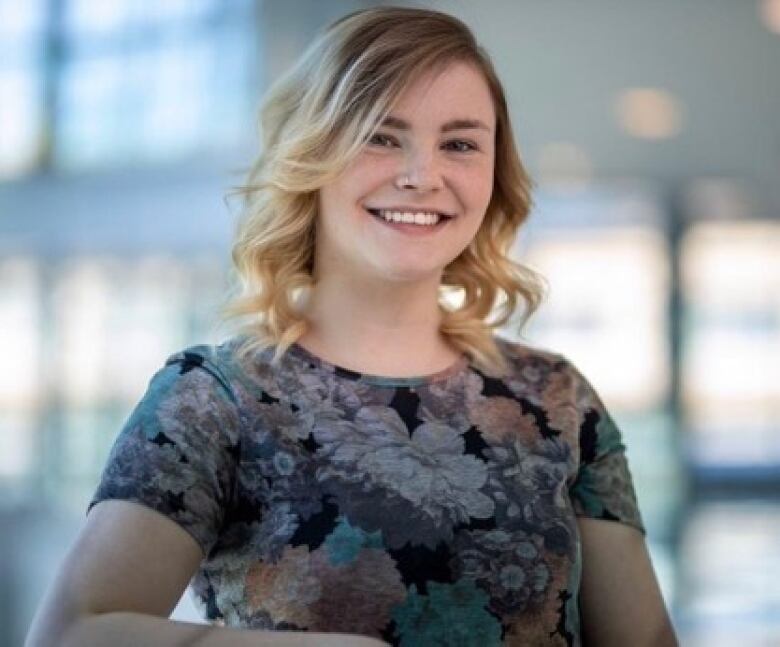Immunocompromised MUN students say they're being forced to choose between safety and education
Memorial's faculty association has formally requested return date be delayed

As Memorial University prepares to resume most on-campus activities on Monday, some immunocompromised students say they feel forgotten.
Jessica Marie Martin, a biology student in her second year, has lupus and chronic active Epstein-Barr virus, which inhibits her immune system's ability to fight infection; she's been struggling to fight off mono for two years.
"I worry about just going to the grocery store and of course, now having to be at a lecture hall with 99 other people, it's just nerve-racking," she toldCBC News.
The university announced last week most courses will resume in person, including classes at the St. John's campus with 99 students or less, all classes at the Marine Institute and classes at the Grenfell Campus "within university occupancy regulations."
Martin says she agrees that in-person learning is often more effective but wants to see additional accommodations forimmunocompromised students like herself.
"They're leaving any student behind with any sort of illness by not at least giving everyone an option to be online or in person," she said.
Instructors encouraged to be flexible
In a bulletin posted on its website Tuesday night, MUN said immunocompromised students can talk about possible informal accommodations with their instructors on a course-by-course basis.
"Instructors are encouraged to be flexible and consider alternate means for students to meet requirements of attendance and or participation," reads the update.MUN said theCentre for Innovation in Teaching and Learning has created resources and supports to assist instructors in planning.
The university said if a student is unable to reach an instructor or come to a solution, the student should thencontact the department head, program chair, associate dean or dean who is responsible for the course.

MUN said if students can't be given an accommodation because of a specific learning objective, they can drop courses.The universityhas extended the deadline to drop courses,students can drop them until Jan.30and get a fullrefund. If they drop courses by Feb.6, they can get a 50 per cent refund.
The update said anyone with COVID-19 symptoms can't go to campus, andstudents who do get COVID-19don't have to submit medical documentation when they missclass.
MUN is allowing individual instructors to decide how they will accommodate students who contractCOVID-19. Martin says that policy makes her nervous because the virus could take her out of commission for longer than the mandated seven days of isolation.
"It's up to the individual professor and, of course, some professors aren't as accommodating," she said.
In an interview last week, MUN'schief risk officer, Greg McDougall, told CBC News the decision on how to accommodate students was left up to individual instructors because of the differing nature and objectives of each course.
Education and safety
Martin said she would like to see more online options for immunocompromised students like herself. She said the fear of going back on campus is already affecting her learning.
"It's hard to want to do your homework and be totally engaged and learning when you're terrified about the consequences of going back to school," she said.
Alison Kavanagh is in her seventh year at MUN, pursuing a bachelor of arts degree after earning a degree in business administration.
She has juvenile onset arthritis, psoriasis and Type 1 diabetes and is on inhalers, steroids and other immuno-suppressing medications. Kavanaghsaid the decision to return to campus ignores the safety concerns of immunocompromised students like herself.

"No one understands that if they aren't going through it themselves or they don't have to worry about anyone in this position," she said.
"You're just trying your best to literally stay alive, and it just feels like no one cares about you anymore. Now it just more feels like all you are is a burden on society."
Hilary Hennessey, external affairs executive director of the Memorial University of Newfoundland Students' Union, said the university's plan doesn'tfollow provincial public health guidelines, which prohibit gatherings of more than 50 people or 25 per cent capacity, whichever is less.
"Where are they coming up with the information to inform such a decision?" she asked.
MUN administration has said the decision to reopen in-person learning was made in conjunction with public health, but Hennessey said the students' union has heard from students in distress.
"They are having to make a ridiculous decision between protecting their health and obtaining an education, which we think is so unethical and unfair."
MUNFA asks administration for more time
On Monday, the Memorial University of Newfoundland Faculty Association formally asked administration to delay reopening campuses until Feb. 28, the day after winter break, or allow instructors to decide whether to hold classes in person or online.
In the release, MUNFA said the delay would allow the university to develop "clear pandemic guidelines" in conjunction with students, faculty and staff.
In its announcement last week, MUN pointed to masks, vaccines, and ventilation as examples of its health and safety measures.
Max Liboiron, a professor in the geography department and former member of the university's COVID-19 response team, said the decision to return to in-person learning contradicts the "precautionary principle" that has guided decisions until now.
Liboiron, who uses they/them pronouns, said they will be recording lectures so students don't have to attend in person. Liboiron said they're concerned about the lack of data showing the spread of the Omicron variant, and the limited capacity within Public Health to perform contact tracing.
"We can't tell if Memorial's going to be a superspreader situation or if my classroom is going to be a superspreader situation."
Liboiron said they understand why administration has not created a universitywide policy dictating how faculty should respond if a student contracts COVID-19, but they believe there will still be problems.
"The unevenness is going to be extreme in how classes are delivered and how absences are dealt with."
Some MUN students have planned a universitywide walkout an action Liboiron said they support.
"If my students walk out on Monday, they will not be penalized in my classes in any way."












_(720p).jpg)


 OFFICIAL HD MUSIC VIDEO.jpg)
.jpg)



























































































